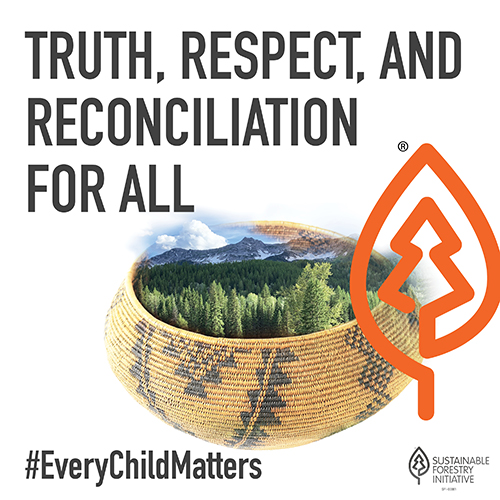By Paul Robitaille, Senior Advisor, Indigenous Relations
 At the end of September, Canada commemorates Truth and Reconciliation Week 2024, culminating in the National Day for Truth and Reconciliation and Orange Shirt Day on September 30. Orange Shirt Day is an initiative started by residential school survivor Phyllis Webstad, Northern Secwepemc (Shuswap) from the Stswecem’c Xgat’tem First Nation, to raise awareness of residential schools and spread the message that every child matters.
At the end of September, Canada commemorates Truth and Reconciliation Week 2024, culminating in the National Day for Truth and Reconciliation and Orange Shirt Day on September 30. Orange Shirt Day is an initiative started by residential school survivor Phyllis Webstad, Northern Secwepemc (Shuswap) from the Stswecem’c Xgat’tem First Nation, to raise awareness of residential schools and spread the message that every child matters.
It’s estimated that over 150,000 Indigenous children were taken from their homes and sent to residential schools between 1831 and 1996. At these schools, children were taught to hate their Indigenous languages, cultures, traditions, and ancestral connections to the land. Many suffered physical, mental, emotional, sexual, and verbal abuse. Many children died or went missing. The National Centre for Truth and Reconciliation has documented over 4,000 children who died at residential schools, but it is estimated that there are more. The residential school system resulted in a legacy of intergenerational trauma and poverty that remains felt by many Indigenous communities today.
To commemorate Truth and Reconciliation Week and September 30, there are many virtual and local in-person events across Canada that you can participate in to honour the survivors of residential schools as well as the children who never got to go home.
Truth and Reconciliation Week events
There are many ways to participate in virtual or in-person events throughout the week. We encourage you to look into local events and attend wearing an orange shirt. Here are some ways you could identify events:
- After identifying the Nations whose land you live and work on, you can visit their website or social media channels to see if they are hosting events. You can explore Native-Land and your city’s or local university’s websites to identify whose traditional and/or treaty territory you live an work on.
- Look at local universities’ Indigenous student associations or student success centres for events.
- Review your museum’s, library’s, cultural centre’s, or city’s websites for events.
- Attend virtual National Centre for Truth and Reconciliation events.
- Participate in the Remembering the Children: National Day for Truth and Reconciliation at Parliament Hill in Ottawa (in person or virtually).
Additional resources
- Explore resources to start your educational journey on truth and reconciliation, including Territory Acknowledgements, the Pass System, residential schools, and more
- Find information on land and traditional stewardship, including forest gardens, cultural burns, and the revival of traditional practices
- Learn more about truth and reconciliation in the forest and conservation sector, including the United Nations Declaration on the Rights of Indigenous Peoples (UNDRIP) and the Truth and Reconciliation Commission of Canada’s Calls to Action
Mental health support
Indigenous People can call The Hope for Wellness Help Line 24 hours a day, seven days a week, for counselling and crisis intervention. Call 1-855-242-3310 or chat online.
